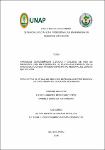| dc.contributor.advisor | Alvarado Cora, Haydee | |
| dc.contributor.advisor | Zapata Vásquez, Eliseo Edgardo | |
| dc.contributor.author | Rodríguez López, Lizbeth Marisel | |
| dc.contributor.author | Sánchez Yahuarcani, Mariela | |
| dc.date.accessioned | 2025-08-01T13:50:11Z | |
| dc.date.available | 2025-08-01T13:50:11Z | |
| dc.date.issued | 2025 | |
| dc.identifier.uri | https://hdl.handle.net/20.500.12737/11666 | |
| dc.description.abstract | The objective was to determine the relationship between clinical demographic variables and quality of life in patients with a history of COVID - 19, treated in the Intensive Care Unit of the Regional Hospital of Loreto Iquitos 2024. The method was quantitative, non-experimental descriptive, correlational and cross-sectional design. The population and sample consisted of 83 patients with a history of COVID - 19, who were treated in the Intensive Care Unit of the Regional Hospital of Loreto. The technique was the survey and the home visit. The instruments were the Demographic and Clinical Data Sheet of Patients with a History of COVID - 19 and the SF 36 Quality of Life Questionnaire. For data processing, the SPSS version 24.0 statistical package was used and, to establish the relationship of the study variables, the non parametric distribution-free inferential statistic called Chi Square (X2) was used with a significance level of α 0.05. The results on the demographic and clinical variables of the patients, 33.7% (28) were 46 to 55 years old, 61.4% (51) were male, 38.6% (32) were in the ICU for 7 to 15 days, 86.7% (72) received mechanical ventilation and 38.6% (32) suffered from hypertension. Regarding the level of quality of life, 78.3% (65) demonstrated having a better quality of life. In conclusion, a significant statistical relationship was found between demographic variables: age (p=0.000), sex (p=0.001), and clinical variables: length of stay in the Intensive Care Unit (p=0.004), mechanical ventilation (p=0.000), and comorbidity (p=0.024) and quality of life in patients with a history of COVID-19. | en_US |
| dc.description.abstract | El objetivo fue, determinar la relación entre las variables demográficas clínicas y calidad de vida en pacientes con antecedentes de COVID – 19, atendidos en la Unidad de Cuidados Intensivos Hospital Regional de Loreto Iquitos 2024.El método fue el cuantitativo, diseño no experimental descriptivo, correlacional y transversal. La población y muestra la conformaron 83 pacientes con antecedentes de COVID – 19, que fueron atendidos en la Unidad de Cuidados Intensivos del Hospital Regional de Loreto. La técnica fue la encuesta y la visita domiciliaria. Los instrumentos fueron, la Ficha de datos demográfico y clínicas de pacientes con antecedentes de COVID – 19 y el Cuestionario de Calidad de Vida SF 36. Para el procesamiento de datos se utilizó el paquete estadístico SPSS versión 24.0 y, para establecer relación de las variables del estudio, se empleó la estadística inferencial no paramétrica de distribución libre denominada Chi Cuadrado (X2) con un nivel de significancia de α 0.05. Los resultados sobre las variables demográficas y clínicas de los pacientes, el 33,7% (28) tenían de 46 a 55 años, el 61,4% (51) fueron del sexo masculino, el 38,6% (32) estuvieron de 7 a 15 días en UCI, el 86,7% (72) recibieron ventilación mecánica y el 38,6% (32) sufrían de hipertensión. Respecto al nivel de calidad de vida, el 78,3% (65) demostraron contar con mejor calidad de vida. En conclusión, se encontró relación estadística significativa entre las variables demográficas: edad (p=0,000), sexo (p=0,001) y clínicas: tiempo en la Unidad de Cuidados Intensivos (p=0,004), ventilación mecánica (p=0,000) y comorbilidad (p=0,024) con la calidad de vida en pacientes con antecedentes de COVID – 19. | es_PE |
| dc.format | application/pdf | es_PE |
| dc.language.iso | spa | es_PE |
| dc.publisher | Universidad Nacional de la Amazonía Peruana | es_PE |
| dc.rights | info:eu-repo/semantics/openAccess | * |
| dc.rights.uri | https://creativecommons.org/licenses/by/4.0/ | * |
| dc.subject | COVID-19 | es_PE |
| dc.subject | Calidad de vida | es_PE |
| dc.subject | Factores sociodemográficos | es_PE |
| dc.subject | Factores epidemiológicos | es_PE |
| dc.subject | Unidades de cuidados intensivos | es_PE |
| dc.title | Variables demográficas clínicas y calidad de vida de pacientes con antecedentes de COVID–19 atendidos en la unidad de cuidados intensivos Hospital Regional de Loreto Iquitos 2024 | es_PE |
| dc.type | info:eu-repo/semantics/masterThesis | es_PE |
| thesis.degree.discipline | Segunda Especialidad en Enfermería en Cuidados Intensivos | es_PE |
| thesis.degree.grantor | Universidad Nacional de la Amazonía Peruana. Unidad de Postgrado de Enfermería | es_PE |
| thesis.degree.name | Título Profesional de Segunda Especialidad en Enfermería en Cuidados Intensivos | es_PE |
| dc.subject.ocde | https://purl.org/pe-repo/ocde/ford#3.02.08 | es_PE |
| renati.author.dni | 43185586 | |
| renati.author.dni | 05377283 | |
| renati.advisor.orcid | https://orcid.org/0000-0002-4769-5124 | |
| renati.advisor.orcid | https://orcid.org/0000-0002-2966-4703 | |
| renati.advisor.dni | 05216035 | |
| renati.advisor.dni | 32815903 | |
| renati.type | https://purl.org/pe-repo/renati/type#tesis | es_PE |
| renati.discipline | 913999 | es_PE |
| renati.level | https://purl.org/pe-repo/renati/level#tituloSegundaEspecialidad | es_PE |
| renati.juror | Silva Acosta Zoraida, Rosario | |
| renati.juror | Salazar Becerril, Nelly | |
| renati.juror | Pinchez Torres, Patricia | |
| dc.publisher.country | PE | es_PE |





